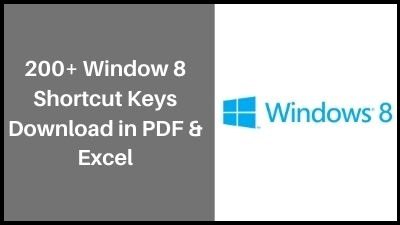Windows 8 is a personal computer operating system that is part of the Windows NT family.
For both desktop computers and tablets, Windows 8 delivered significant changes to the Windows operating system and its user interface (UI). It’s a touch-friendly platform based on the contemporary Metro design architecture, which specifies how apps are distributed and presented in the user interface.
Windows 8, in addition to having a significantly different appearance and feel than its predecessor, touted shorter startup times and improved performance, but it failed to gain critical mass among both corporate and consumer users.
Windows 8 Keyboard Shortcuts List
General
| F1 | Display Help |
| F2 | Rename the selected item |
| F3 | Search for a file or folder |
| F4 | Display the address bar list in File Explorer |
| F5 | Refresh the active window |
| F6 | Cycle through screen elements in a window or on the desktop |
| F10 | Activate the Menu bar in the active app |
| Alt+F4 | Close the active item, or exit the active app |
| Alt+Esc | Cycle through items in the order in which they were opened |
| Alt+underlined letter | Perform the command for that letter |
| Alt+Enter | Display properties for the selected item |
| Alt+Spacebar | Open the shortcut menu for the active window |
| Alt+Left arrow | Back |
| Alt+Right arrow | Forward |
| Alt+Page Up | Move up one screen |
| Alt+Page Down | Move down one screen |
| Alt+Tab | Switch between open apps (except desktop apps) |
| Ctrl+F4 | Close the active document (in apps that allow you to have multiple documents open simultaneously) |
| Ctrl+A | Select all items in a document or window |
| Ctrl+C (or Ctrl+Insert) | Copy the selected item |
| Ctrl+D (or Delete) | Delete the selected item and move it to the Recycle Bin |
| Ctrl+R (or F5) | Refresh the active window |
| Ctrl+V (or Shift+Insert) | Paste the selected item |
| Ctrl+X | Cut the selected item |
| Ctrl+Y | Redo an action |
| Ctrl+Z | Undo an action |
| Ctrl+plus (+) or Ctrl+minus (-) | Zoom in or out of a large number of items, like apps pinned to the Start screen |
| Ctrl+ mouse scroll wheel | Change the size of desktop icons or zoom in or out of a large number of items, like apps pinned to the Start screen |
| Ctrl+Right arrow | Move the cursor to the beginning of the next word |
| Ctrl+Left arrow | Move the cursor to the beginning of the previous word |
| Ctrl+Down arrow | Move the cursor to the beginning of the next paragraph |
| Ctrl+Up arrow | Move the cursor to the beginning of the previous paragraph |
| Ctrl+Alt+Tab | Use the arrow keys to switch between all open apps |
| Ctrl+arrow key (to move to an item)+Spacebar | Select multiple individual items in a window or on the desktop |
| Ctrl+Shift with an arrow key | Select a block of text |
| Ctrl+Esc | Open the Start screen |
| Ctrl+Shift+Esc | Open Task Manager |
| Ctrl+Shift | Switch the keyboard layout when multiple keyboard layouts are available |
| Ctrl+Spacebar | Turn the Chinese input method editor (IME) on or off |
| Shift+F10 | Display the shortcut menu for the selected item |
| Shift with any arrow key | Select more than one item in a window or on the desktop, or select text within a document |
| Shift+Delete | Delete the selected item without moving it to the Recycle Bin first |
| Right arrow | Open the next menu to the right, or open a submenu |
| Left arrow | Open the next menu to the left, or close a submenu |
| Esc | Stop or leave the current task |
Windows logo key
| Windows logo key + F1 | Open Windows Help and Support |
| Windows logo key | Display or hide the Start screen |
| Windows logo key + B | Set focus in the notification area |
| Windows logo key + C | Open the Charms |
| Windows logo key + D | Display and hide the desktop |
| Windows logo key + E | Open File Explorer |
| Windows logo key + F | Open the Search charm and search for files |
| Windows logo key + H | Open the Share charm |
| Windows logo key + I | Open the Settings charm |
| Windows logo key + K | Open the Devices charm |
| Windows logo key + L | Lock your PC or switch people |
| Windows logo key + M | Minimize all windows |
| Windows logo key + O | Lock device orientation |
| Windows logo key + P | Choose a presentation display mode |
| Windows logo key + Q | Open the Search charm to search everywhere or within the open app (if the app supports app search) |
| Windows logo key + R | Open the Run dialog box |
| Windows logo key + S | Open the Search charm to search Windows and the web |
| Windows logo key + T | Cycle through apps on the taskbar |
| Windows logo key + U | Open Ease of Access Center |
| Windows logo key + V | Cycle through notifications |
| Windows logo key + Shift + V | Cycle through notifications in reverse order |
| Windows logo key + W | Open the Search charm and search for settings |
| Windows logo key + X | Open the Quick Link menu |
| Windows logo key + Z | Show the commands available in the app |
| Windows logo key + , | Temporarily peek at the desktop |
| Windows logo key + Pause | Display the System Properties dialog box |
| Windows logo key + Ctrl + F | Search for PCs (if you’re on a network) |
| Windows logo key + Shift + M | Restore minimized windows on the desktop |
| Windows logo key + number | Open the desktop and start the app pinned to the taskbar in the position indicated by the number. If the app is already running, switch to that app. |
| Windows logo key + Shift + number | Open the desktop and start a new instance of the app pinned to the taskbar in the position indicated by the number |
| Windows logo key + Ctrl + number | Open the desktop and switch to the last active window of the app pinned to the taskbar in the position indicated by the number |
| Windows logo key + Alt + number | Open the desktop and open the Jump List for the app pinned to the taskbar in the position indicated by the number |
| Windows logo key + Ctrl + Shift + number | Open the desktop and open a new instance of the app located at the given position on the taskbar as an administrator |
| Windows logo key + Tab | Cycle through recently used apps (except desktop apps) |
| Windows logo key + Ctrl + Tab | Cycle through recently used apps (except desktop apps) |
| Windows logo key + Shift + Tab | Cycle through recently used apps (except desktop apps) in reverse order |
| Windows logo key + Ctrl + B | Switch to the app that displayed a message in the notification area |
| Windows logo key + Up arrow | Maximize the window |
| Windows logo key + Down arrow | Remove current app from screen or minimize the desktop window |
| Windows logo key + Left arrow | Maximize the app or desktop window to the left side of the screen |
| Windows logo key + Right arrow | Maximize the app or desktop window to the right side of the screen |
| Windows logo key + Home | Minimize all but the active desktop window (restores all windows on second stroke) |
| Windows logo key + Shift + Up arrow | Stretch the desktop window to the top and bottom of the screen |
| Windows logo key + Shift + Down arrow | Restore/minimize active desktop windows vertically, maintaining width |
| Windows logo key + Shift + Left arrow or Right arrow | Move an app or window in the desktop from one monitor to another |
| Windows logo key + Spacebar | Switch input language and keyboard layout |
| Windows logo key + Ctrl + Spacebar | Change to a previously selected input |
| Windows logo key + Enter | Open Narrator |
| Windows logo key + Shift + period (.) | Cycle through open apps |
| Windows logo key + period (.) | Cycle through open apps |
| Windows logo key + / | Initiate IME reconversion |
| Windows logo key + Alt + Enter | Open Windows Media Center |
| Windows logo key + plus (+) or minus (-) | Zoom in or out using Magnifier |
| Windows logo key + Esc | Exit Magnifier |
Dialog box
| F1 | Display Help |
| F4 | Display the items in the active list |
| Ctrl+Tab | Move forward through tabs |
| Ctrl+Shift+Tab | Move back through tabs |
| Ctrl+number (number 1-9) | Move to nth tab |
| Tab | Move forward through options |
| Shift+Tab | Move back through options |
| Alt+underlined letter | Perform the command (or select the option) that goes with that letter |
| Spacebar | Select or clear the check box if the active option is a check box |
| Backspace | Open a folder one level up if a folder is selected in the Save As or Open dialog box |
| Arrow keys | Select a button if the active option is a group of option buttons |
Taskbar
| Shift+click a taskbar button | Open an app or quickly open another instance of an app |
| Ctrl+Shift+click a taskbar button | Open an app as an administrator |
| Shift+right-click a taskbar button | Show the window menu for the app |
| Shift+right-click a grouped taskbar button | Show the window menu for the group |
| Ctrl+click a grouped taskbar button | Cycle through the windows of the group |
Remote Desktop Connection on the desktop
| Alt+Page Up | Move between apps from left to right |
| Alt+Page Down | Move between apps from right to left |
| Alt+Insert | Cycle through apps in the order that they were started |
| Alt+Home | Display the Start screen |
| Ctrl+Alt+Break | Switch between a window and full screen |
| Ctrl+Alt+End | Display the Windows Securitydialog box |
| Ctrl+Alt+Home | In full-screen mode, activate the connection bar |
| Alt+Delete | Display the system menu |
Windows Help viewer
| F3 | Move the cursor to the search box |
| F10 | Display the Options menu |
| Home | Move to the beginning of a topic |
| End | Move to the end of a topic |
| Alt+Left arrow | Move back to the previously viewed topic |
| Alt+Right arrow | Move forward to the next (previously viewed) topic |
| Alt+Home | Display the Help and Support home page |
| Alt+A | Display the customer support page |
| Alt+C | Display the Table of Contents |
| Alt+N | Display the Connection Settings menu |
| Ctrl+F | Search the current topic |
| Ctrl+P | Print a topic |
Calculator
| F1 | Open Calculator Help |
| F2 | Edit the calculation history |
| Alt+1 | Switch to Standard mode |
| Alt+2 | Switch to Scientific mode |
| Alt+3 | Switch to Programmer mode |
| Alt+4 | Switch to Statistics mode |
| Alt+C | Calculate or solve date calculations and worksheets |
| Ctrl+E | Open date calculations |
| Ctrl+H | Turn calculation history on or off |
| Ctrl+L | Press the MC button |
| Ctrl+M | Press the MS button |
| Ctrl+P | Press the M+ button |
| Ctrl+Q | Press the M- button |
| Ctrl+R | Press the MR button |
| Ctrl+U | Open unit conversion |
| Ctrl+Shift+D | Clear the calculation history |
| F9 | Press the +/– button |
| R | Press the 1/× button |
| @ | Press the square root button |
| Del | Press the CE button |
| Up arrow | Move up in the calculation history |
| Down arrow | Move down in the calculation history |
| Esc | Press the C button or stop editing the calculation history |
| Enter | Recalculate the calculation history after editing |
| F3 | Select Degrees in Scientific mode |
| F4 | Select Radians in Scientific mode |
| F5 | Select Grads in Scientific mode |
| Ctrl+B | Press the 3vx button in Scientific mode |
| Ctrl+G | Press the 10x button in Scientific mode |
| Ctrl+O | Press the cosh button in Scientific mode |
| Ctrl+S | Press the sinh button in Scientific mode |
| Ctrl+T | Press the tanh button in Scientific mode |
| Ctrl+Y | Press the yvx button in Scientific mode |
| D | Press the Mod button in Scientific mode |
| I | Press the Inv button in Scientific mode |
| L | Press the log button in Scientific mode |
| M | Press the dms button in Scientific mode |
| N | Press the ln button in Scientific mode |
| O | Press the cos button in Scientific mode |
| P | Press the pi button in Scientific mode |
| Q | Press the x^2 button in Scientific mode |
| S | Press the sin button in Scientific mode |
| T | Press the tan button in Scientific mode |
| V | Press the F-E button in Scientific mode |
| X | Press the Exp button in Scientific mode |
| Y | Press the x^y button in Scientific mode |
| # | Press the x^3 button in Scientific mode |
| ; | Press the Int button in Scientific mode |
| ! | Press the n! button in Scientific mode |
| F2 | Select Dword in Programmer mode |
| F3 | Select Word in Programmer mode |
| F4 | Select Byte in Programmer mode |
| F5 | Select Hex in Programmer mode |
| F6 | Select Dec in Programmer mode |
| F7 | Select Oct in Programmer mode |
| F8 | Select Bin in Programmer mode |
| F12 | Select Qword in Programmer mode |
| A-F | Press the A-F buttons in Programmer mode |
| J | Press the RoL button in Programmer mode |
| K | Press the RoR button in Programmer mode |
| < | Press the Lsh button in Programmer mode |
| > | Press the Rsh button in Programmer mode |
| % | Press the Mod button in Programmer mode |
| | | Press the Or button in Programmer mode |
| ^ | Press the Xor button in Programmer mode |
| ~ | Press the Not button in Programmer mode |
| & | Press the And button in Programmer mode |
| Spacebar | Toggles the bit value in Programmer mode |
| A | Press the Average button in Statistics mode |
| Ctrl+A | Press the Average Sq button in Statistics mode |
| S | Press the Sum button in Statistics mode |
| Ctrl+S | Press the Sum Sq button in Statistics mode |
| T | Press the S.D. button in Statistics mode |
| Ctrl+T | Press the Inv S.D. button in Statistics mode |
| D | Press the CAD button in Statistics mode |
Thank you for reading, If you liked this article, then definitely share it with your friends on social media, so that they too can get this information.
Download Excel File









